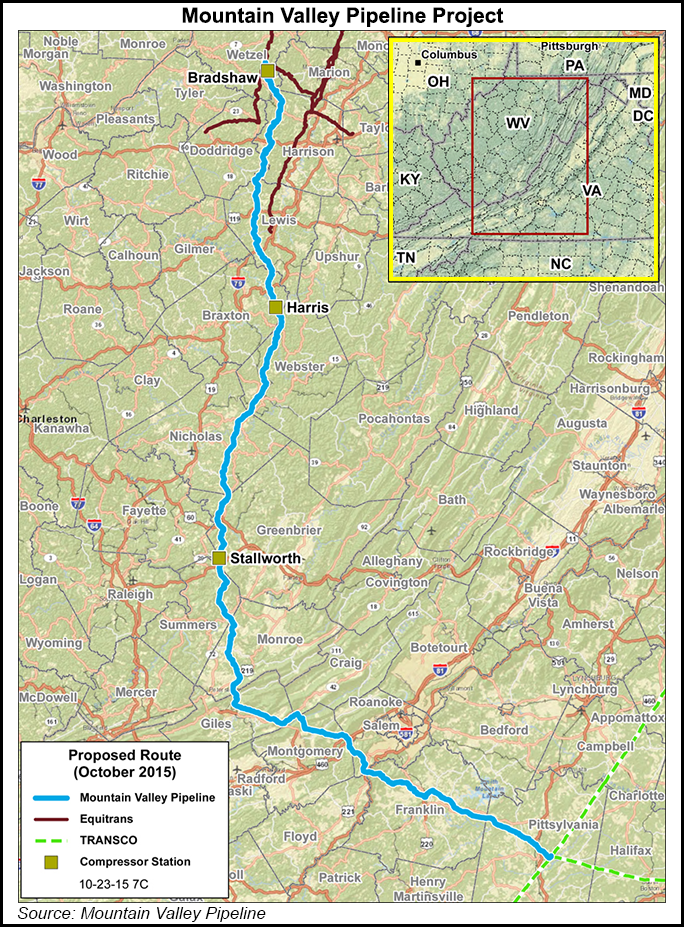Regulatory | Infrastructure | NGI All News Access
MVP Loses All Water Crossing Approvals After Latest Army Corps Suspension
Another U.S. Army Corps of Engineers office has suspended authorization for Mountain Valley Pipeline (MVP) to cross dozens more streams and wetlands in West Virginia, citing a federal appeals court decision earlier this month that vacated a key permit.

The Army Corps Pittsburgh District said the U.S. Court of Appeals for the Fourth Circuit’s decision to vacate MVP’s compliance with the Nationwide Permit (NWP) 12 in the Army Corps’ Huntington, WV, district, and the Norfolk District’s decision to subsequently suspend authorizations for water crossings in Virginia, left it no choice but to suspend additional authorizations. The Pittsburgh District’s order applies to 59 stream crossings and 62 wetland crossings in Wetzel and Harrison counties, WV.
MVP is required to have NWP 12 authorizations from all three Army Corps districts in order to continue construction. It now has none and is prohibited from construction in any stream or wetland in its path. MVP said in a filing with FERC on Monday that it has suspended construction of new pipeline crossings in the Pittsburgh district.
MVP may also request a meeting within 10 days of the suspension. Following a meeting, the Army Corps said it could move to reinstate, modify or revoke authorizations under NWP 12.
Plagued by ongoing legal challenges, permit issues, work stoppages and inclement weather, MVP has already raised its cost estimate for the project by about $1 billion to $4.6 billion. The project has also pushed back its in-service date twice in recent months, once from 4Q2018 to 1Q2019, and then again to 4Q2019.
MVP spokesperson Natalie Cox said the project’s backers don’t expect additional delays to the late 2019 in-service date after the latest suspension. MVP expects the Army Corps’ Huntington District office to issue a new NWP 12 by early next year, at which point Cox said the Pittsburgh and Norfolk districts’ authorizations can be reinstated, allowing all stream and wetland crossing work to continue in both states.
NWP 12 is issued by the Army Corps and allows contractors to trench through streams and rivers under Section 404 of the Clean Water Act. Opposition groups challenged the permit, seizing on a special condition included in the NWP 12 in West Virginia, which requires all stream crossings be constructed within 72 hours.
For four proposed crossings in West Virginia’s Elk, Gauley, Greenbrier and Meadow rivers, MVP had planned to use the more environmentally protective but time-consuming “dry cut” crossing method, ostensibly violating the 72-hour special condition.
In vacating the NWP 12, the Fourth Circuit concluded that the Army Corps “lacked authority to substitute the ”dry cut’ requirement ”in lieu of’ West Virginia’s 72-hour temporal restriction,” citing federal law requiring that “if any part of a project requires an individual permit, then ”the NWP does not apply and all portions of the project must be evaluated as part of the individual permit process.’”
The environmental groups that challenged the permit continued their push on Monday for the Federal Energy Regulatory Commission to suspend all work along MVP’s 300-mile route, arguing that the project no longer has all the necessary permits to continue construction.
MVP would move 2 Bcf/d of Appalachian natural gas to markets in the Southeast and Mid-Atlantic via an interconnect with the Transcontinental Gas Pipe Line in southwestern Virginia.
Meanwhile, the similarly routed Atlantic Coast Pipeline received key regulatory approvals to start work in Virginia. The state Department of Environmental Quality on Friday approved ACP’s erosion and sediment control plans and storm water management plans.
ACP spokesman Aaron Ruby called the approvals a “major step forward” for the project, which has also faced staunch environmental opposition and delays. The agency’s approval allows the state’s water quality certification to take effect and is the final state approval needed to begin pipeline construction in Virginia.
Some work in the state will remain on hold, however, after the Fourth Circuit last month stayed decisions by the U.S. Forest Service allowing tree clearing, blasting and trenching in the George Washington National Forest and the Monongahela National Forest in Virginia and West Virginia.
The court stayed the authorizations to review a challenge filed in February by the Southern Environmental Law Center and the Sierra Club on behalf of several regional environmental organizations. Those groups are also calling on FERC to suspend all ACP work, arguing that the project no longer has all the necessary approvals.
ACP would originate in West Virginia, pass through Virginia and into North Carolina to move 1.5 Bcf/d of Appalachian natural gas to the Southeast.
© 2024 Natural Gas Intelligence. All rights reserved.
ISSN © 1532-1231 | ISSN © 2577-9877 |
